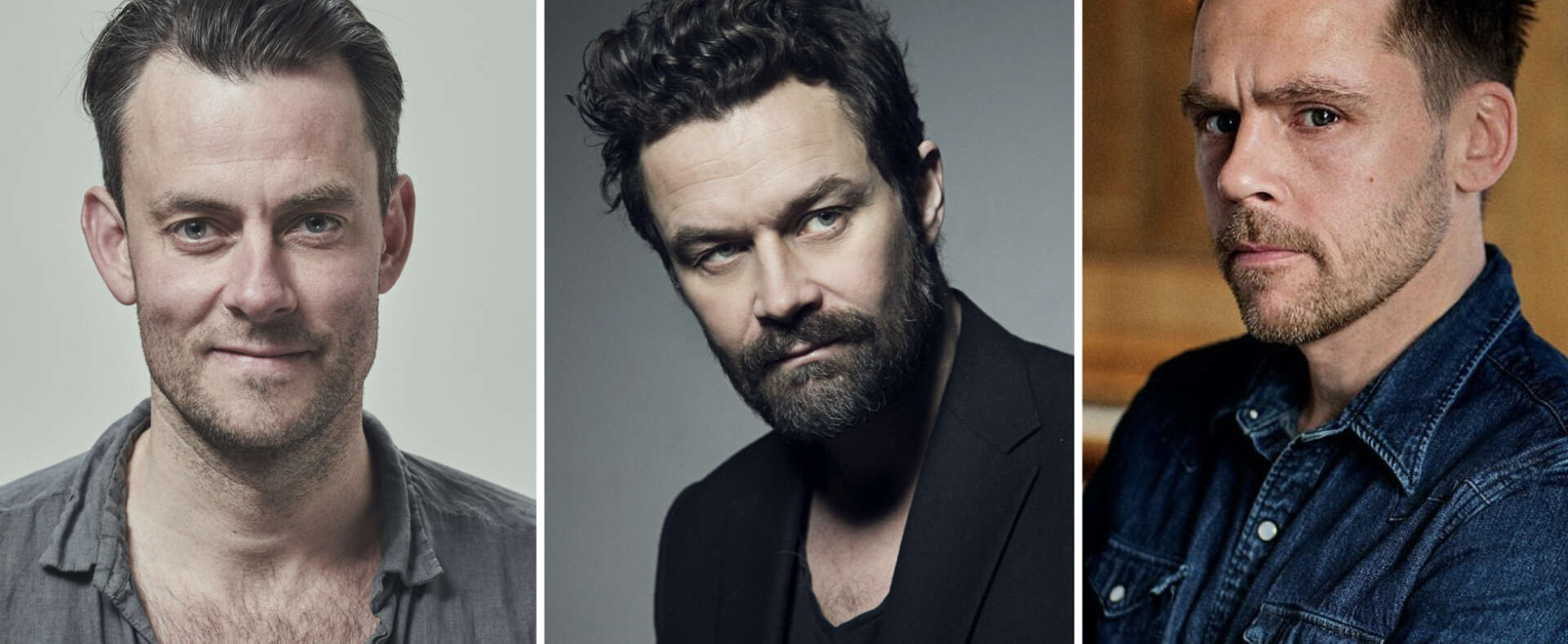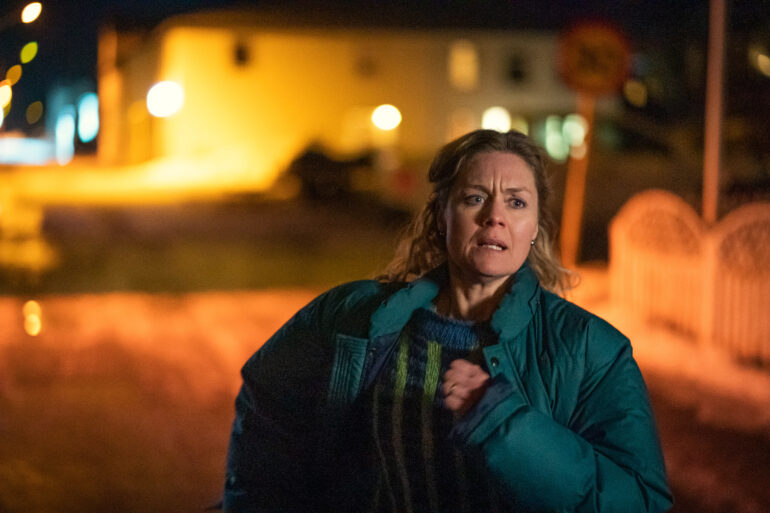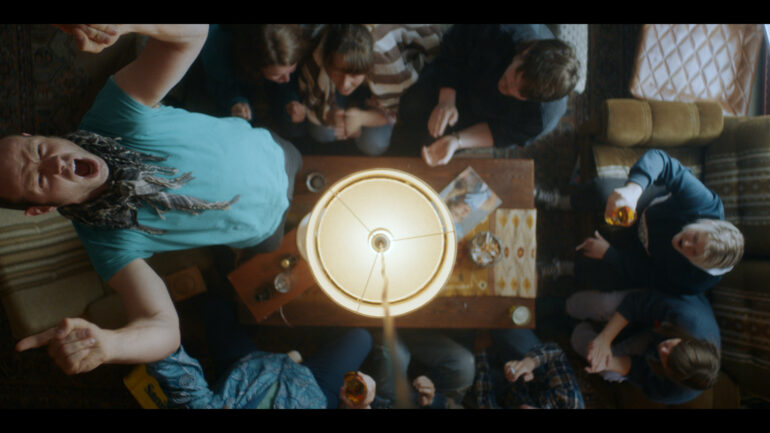
Blackport co-writers Gísli Örn Gardarsson, Björn Hlynur Haraldsson, Mikael Torfason discuss the Icelandic series, one of RÚV’s biggest successes of the last decade.
The political thriller set in the fishing industry is among five series competing for the 6th Nordisk Film & TV Fond Prize for outstanding screenwriting of a Nordic drama series, to be handed out February 2, 2022 during Göteborg’s TV Drama Vision.
Co-founders of Vesturport, one of Europe’s most innovative film, TV and theatre groups, Garðarsson and Haraldsson also served as co-creators, actors and producers on the show with Nína Dögg Filippusdóttir. Nana Alfredsdóttir was also producer.
On screen Garðarsson has appeared in Ragnarok, Vultures, The Oath, Parents, Beowulf: Return to the Shiedlands among others; Haradsson’s credit include Fortitude, Trapped, Lamb, Agnes Joy, The Borgias.
Mikael Torfason has written eight novels, ten plays, the Netflix original The Valhalla Murders, and film Agnes Joy among others.
Based on reality, the series is set in the 1980‘s in a small Icelandic fishing village. We follow the married couple, Harpa and Grimur, as they build a small fishing empire along with their childhood friends. The introduction of a new fishing quota system, resulting the privatization of fishing grounds, leads to a struggle for power, jealousy, greed and betrayal.
The series which won Best International Drama at the last Series Mania, was produced by Vesturport for RÚV and Arte France, in co-production with the UK’s Turbine Studios, backing from DR, NRK, SVT, Yle and Nordisk Film & TV Fond among others. About Premium Content handles sales.
What does it mean for you to be nominated for the Nordisk Film & TV Fond Prize?
Gísli Örn Gardarsson: Given the amount of great writing that has come from the Nordic countries, it's of course an honour to be considered in that category. We've spent so much time on creating the series and getting the scripts in order. I think we threw out at least four completed drafts of the series before finding the tone we were confident with. Getting this nod tells us it was perhaps not all in vain.
Mikael Torfason: It is quite an honour. Last time I was in Göteborg I was there with my father to seek medical treatment. He had drunk his liver away and died a few days after we got back to Iceland. I actually named the captain in episode one Torfi after my father because they share that fate together. So, I guess personally I have almost an emotional response. Quite healing, and an honour.
Tell us about the genesis of Blackport…
GOG: Pretty much everyone in Iceland has a connection to a fishing village. All these villages had the same source for survival: the fish. In 1983 a new system was introduced; a quota system which purpose was to protect the fishing grounds from over fishing. The system had a very big effect on all these villages and even to this day people seem to have a very hard time understanding what exactly happened - us included. So, we decided to make a TV series about the period and create characters that would go through the creation of the system and somehow have a resonance with it.
In what way is the series personal to you?
GOG: We were teenagers during that period which carries so much nostalgia for everyone in Iceland. It's set in surroundings where our families lived, and it deals with issues that we had to get our heads around. On a more non-fictional level, it deals with middle-aged people getting into power. Being slightly middle-aged, we wanted to place ourselves into the time and space of Blackport, with the thought of how we would act in the given circumstances.
MT: I used to work as a journalist and got my first job in 1996, which is only a couple of years after all these events happened. I grew up with them but really got to understand them after I started working as a journalist, and later as editor-in-chief of that same newspaper. The quota system is something that people are still debating in Iceland, and I can see from the reaction Blackport is getting from Icelandic viewers, that almost everyone in Iceland feels that this series is personal. So do we. This is an important story for us.
Björn Hlynur Haraldsson: The story is an extremely hot topic in Iceland and has been for a few decades. We were a bit too young to really get our heads around what really happened in the 80´s regarding the quotas, which is of course our main natural resource. We were intrigued by this major issue in our country and were eager to learn more about it.
How did you share the writing process?
GOG: As mentioned before, we'd binned a few drafts, but then we invited Mikael to the room, he got it and found the right tone of what we were after and wrote a draft. That's when we got really excited and felt we were on the right path.
The series is inspired by a whole decade (1983-1991) so there was a lot to go after in terms of the politics. Then the benefits - or the curse perhaps - of our involvement was so vast - acting, directing, producing, writing, that Björn and I were constantly writing and rewriting.
We’d even re-write and change things the day before shooting, pretty much every day. We'd sit down with every scene and ask ourselves; what is the scene really about, and make changes if we felt they were needed. It's a little mad, but it's the way we always work when we create stuff for theatre for example. And we'd make sure we would capture the absurd, dramatic and highly humorous times.
BHH: The writing process was a very collaborative one between the three of us. After so many rewrites through the years, we tend to forget who did what. Mainly because so much of the script is based on true stories we heard while researching the era, politically-wise as well as personally. Those things tend to blend together when the characters are involved in something that becomes massive corporate business.
MT: Gisli and Björn Hlynur are not only great actors and directors but they’re also pretty good writers and really good dramaturges. It was so great to work with them and their passion for the project was extreme. Like, really extreme. And when I saw the outcome, I was just blown away.
It takes a lot to pull something like this off, and the sacrifice that they have made both in the writer’s room and then by both starring and directing. I just can’t get my head around that but I am so proud and grateful to have been part of this journey. The results are amazing. I mean, that’s not a given and I swear, when I first watched the pilot, it almost floored me. The acting, directing, cinematography. It all came together.
Regarding the actual writing, I think a part of what I brought to the table was my background in journalism and my understanding of how Iceland works. Both in business and politics. Blackport is a realistic series and our scripts have a deep understanding of how everything works in Iceland. You need to mix that up with dramatic storytelling. This story is not only about the drama or the politics or the business, but all of these things.
What were the biggest challenges in the writing process? Making sure you would offer an objective or multi-side view of the fishing quotas? Building a storyline that would go beyond that?
GOG: We were very conscious of not having an agenda, other than creating characters that enter the stage with an unspoilt canvas. They are then brought forward through the development of the quota system. And what was fun in writing it, was that the characters quite quickly took on a voice of their own. Sometimes it felt like magic; writing a dialogue and the characters would speak for themselves. Sometimes we felt like we were a mere channel for their voices. This is a story made by Icelandic artists for an Icelandic market. But then as we all know, human drama is always international. And then when you throw the local natural resources into play, power and greed quickly follow. So, I guess one cannot escape international interest.
MT: First of all, it should be impossible to make the Icelandic Fishing Quota System interesting. It is not only complex, but also something that has dominated discussions in Iceland for decades now. The topic itself is difficult and personal in Iceland, even though it might be a bit abstract for someone who has never heard of it. So, an objective view was important, but I always believe that if a local story is done very well, it will find an international audience. Blackport is very local, but that is the appeal, I would think.
Could you discuss the visual style?
GOG: We wanted to show the 80's as we remember them as teenagers. Colourful times. Rough times. Extrovert times. Times where there was a certain freedom. Before "health and safety". It was like the wild west in many ways. We had our own style. We were very much between the USA and USSR - and we could have belonged to either side.
In terms of the sets and locations, the big challenge was that it's pre-Ikea. That means that no location can have anything from Ikea. And you'd never imagine how hard it is to find a location with no Ikea furniture! There is also a limited stock of props and furniture from the time, so our art department had quite a tough time sourcing material.
How was your collaboration with RÚV and Arte France?
GOG: RÚV has been involved from very early on, and our collaboration is and has always been very good. Needless to say, the series would not be where it is without them. They give their artists complete freedom and there is no form of censorship.
We've never worked with Arte before, so we didn’t really know what to expect. We perhaps thought we'd be a small unit, forgotten in their catalogue of other bigger more exciting projects. But on the contrary, they have been mind-blowingly invested. We've had such deep conversations with them on every level of the production. Their notes on the scripts were extremely thorough, their eyes were on the first dailies, and in the editing process they've been at the next level in terms of feedback. They are involved in every aspect all the time. Their support has been exemplary in so many ways. It's actually very hard to foresee doing another project without them.
What’s next for you?
GOG: The process of Blackport has been very long and all-consuming. So, once we lock the final episode, I'm going to catch my breath and I'm sure we will begin creating our next TV series before too long. I also have quite a few stage creations lined-up.
MT: I am presenting the new series Vanished at TV Drama Vision in Göteborg. Then of course Gisli, Björn Hlynur and I are discussing projects. But apart from that, since Blackport, I have moved to Berlin and am working on a couple of series here that are in development.
BHH: I’m developing two scripts. One of my own, which is a US version of my first feature film in Icelandic The Homecoming (Blóðberg). The other is a script that I’m developing with writer and poet SJÓN, with whom I just worked on Lamb.
Can you cite the top 3 TV shows (Nordic or non-Nordic) that you’ve watched recently?
GOG: Dopesick, Home for Christmas, and State of Happiness. Brilliant stuff!
MT: Succession, Dopesick and Euphoria. The last Scandinavian series I saw was The Chestnut Man-very good writing.
BHH: Top two of last year have to be The White Lotus and Succession. The most recent one I’ve watched is The Flight Attendant.

